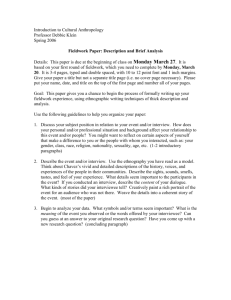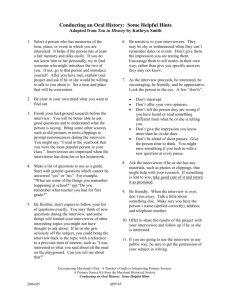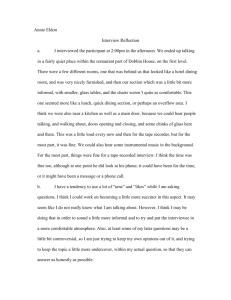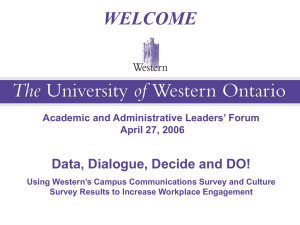Kristin Riley Reflection Paper – Interview Project 4/15
advertisement
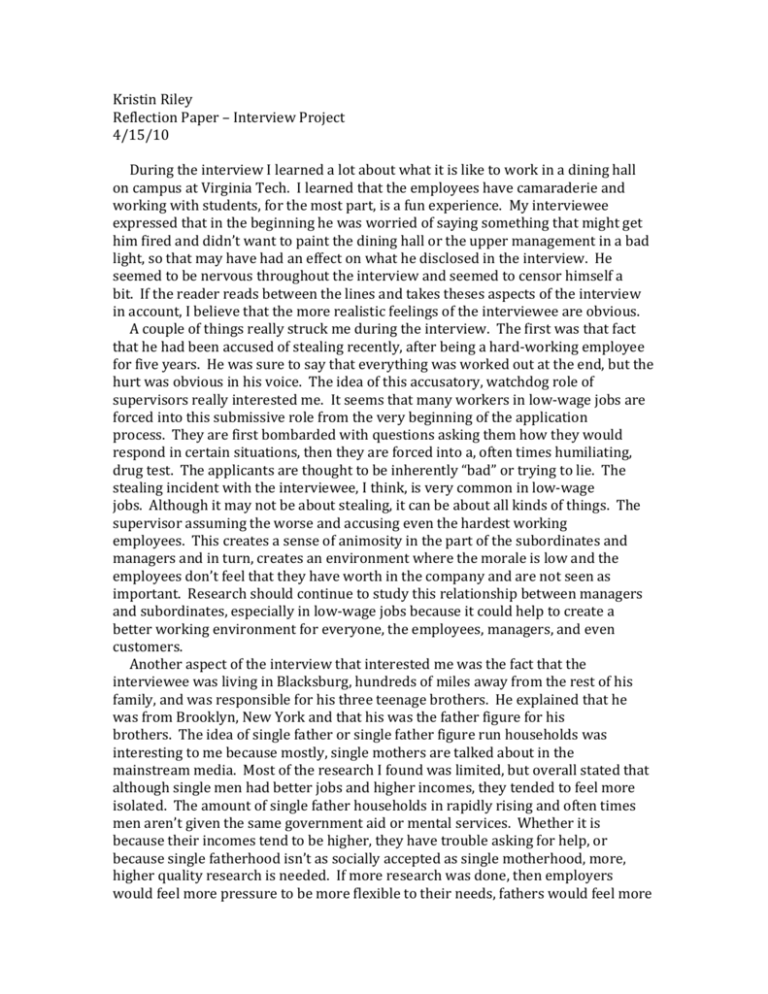
Kristin Riley Reflection Paper – Interview Project 4/15/10 During the interview I learned a lot about what it is like to work in a dining hall on campus at Virginia Tech. I learned that the employees have camaraderie and working with students, for the most part, is a fun experience. My interviewee expressed that in the beginning he was worried of saying something that might get him fired and didn’t want to paint the dining hall or the upper management in a bad light, so that may have had an effect on what he disclosed in the interview. He seemed to be nervous throughout the interview and seemed to censor himself a bit. If the reader reads between the lines and takes theses aspects of the interview in account, I believe that the more realistic feelings of the interviewee are obvious. A couple of things really struck me during the interview. The first was that fact that he had been accused of stealing recently, after being a hard-­‐working employee for five years. He was sure to say that everything was worked out at the end, but the hurt was obvious in his voice. The idea of this accusatory, watchdog role of supervisors really interested me. It seems that many workers in low-­‐wage jobs are forced into this submissive role from the very beginning of the application process. They are first bombarded with questions asking them how they would respond in certain situations, then they are forced into a, often times humiliating, drug test. The applicants are thought to be inherently “bad” or trying to lie. The stealing incident with the interviewee, I think, is very common in low-­‐wage jobs. Although it may not be about stealing, it can be about all kinds of things. The supervisor assuming the worse and accusing even the hardest working employees. This creates a sense of animosity in the part of the subordinates and managers and in turn, creates an environment where the morale is low and the employees don’t feel that they have worth in the company and are not seen as important. Research should continue to study this relationship between managers and subordinates, especially in low-­‐wage jobs because it could help to create a better working environment for everyone, the employees, managers, and even customers. Another aspect of the interview that interested me was the fact that the interviewee was living in Blacksburg, hundreds of miles away from the rest of his family, and was responsible for his three teenage brothers. He explained that he was from Brooklyn, New York and that his was the father figure for his brothers. The idea of single father or single father figure run households was interesting to me because mostly, single mothers are talked about in the mainstream media. Most of the research I found was limited, but overall stated that although single men had better jobs and higher incomes, they tended to feel more isolated. The amount of single father households in rapidly rising and often times men aren’t given the same government aid or mental services. Whether it is because their incomes tend to be higher, they have trouble asking for help, or because single fatherhood isn’t as socially accepted as single motherhood, more, higher quality research is needed. If more research was done, then employers would feel more pressure to be more flexible to their needs, fathers would feel more accepted, and there would be an increase in quality resources available. A lot of the research focused on the effect single fatherhood has on children. While I agree the outcome for children is important, if more research focused on the fathers and giving them better resources or counseling services, then I believe that most of the effects single fatherhood has on children would be eliminated. Focusing only on the children and the bad effects living with a single father has on them, demonizes the father and only makes it harder for single dads to feel accepted. Before any policy recommendations are made, more father focused research needs to be done. This project confirmed my belief that the American dream is impossible for the average American. Our culture loves to look at the success stories and believe that it is possible for anyone to be that successful if they just work hard enough. The idea that anyone can become rich and have the American dream is incredibly naïve. Focusing on the untouchable success stories about the man that came from nothing and worked his way up the ladder are only hurting the people who are in the lower class and trying to make a living. It creates a feeling that nothing needs to be done to help the people who need it, because a few lucky ones could have the American dream. It is a safety mechanism for peoples’ egos as well to focus on the success stories. The reality is the people, who are in the low-­‐wage jobs, work hard day in and day out and are not receiving enough respect because of our culture’s idolization of the lucky few.

